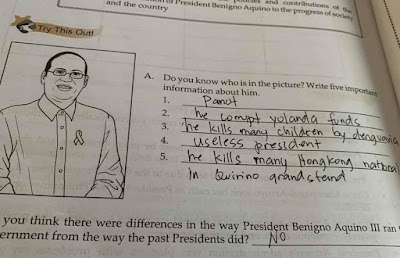Facts Before Critical Thinking
"Factual knowledge must precede skill" is one of the guiding cognitive principles that Willingham uses in his book, "Why Don't Students Like School?: A Cognitive Scientist Answers". The reason behind this principle is simple: How can one think if there is nothing to think about. There is an ongoing disdain for facts retrieval practice in basic education. A popular mantra is "to teach children how to think and not what to think". Obviously, simply forcing students to memorize a set of facts is not sound education. It is, however, only with background knowledge can a mind begin to make connections, analyze, and construct new knowledge. Teaching facts is important. I think the real problem is we often lack direction or purpose when we teach facts. What facts should we teach our students? And as Willingham notes, "This question often becomes politically charged rather quickly". In the Philippines, this becomes all so real as illustrated in the following item.
Presumably, this learning material is an attempt to teach students the virtues of the Aquino administration. Interestingly, this has backfired.
But seriously, what facts need to be taught? The answer to this question depends on the discipline or domain. In chemistry, facts about the atoms are essential. In biology, there is a central dogma. And, of course, in mathematics, there are arithmetic facts. These facts need to be taught, and ideally with examples of how these are connected to each other. These important facts need to be taught with meaning. And it is never too early to introduce to young minds how we think about these facts.
Agarwal from the Washington University in St. Louis recently published a paper in the Journal of Educational Psychology with the following abstract.
The development of students’ higher order learning is a critical component of education. For decades, educators and scientists have engaged in an ongoing debate about whether higher order learning can only be enhanced by building a base of factual knowledge (analogous to Bloom’s taxonomy) or whether higher order learning can be enhanced directly by engaging in complex questioning and materials. The relationship between fact learning and higher order learning is often speculated, but empirically unknown. In this study, middle school students and college students engaged in retrieval practice with fact questions, higher order questions, or a mix of question types to examine the optimal type of retrieval practice for enhancing higher order learning. In laboratory and K-12 settings, retrieval practice consistently increased delayed test performance, compared with rereading or no quizzes. Critically, higher order
and mixed quizzes improved higher order test performance, but fact quizzes did not. Contrary to popular intuition about higher order learning and Bloom’s taxonomy, building a foundation of knowledge via fact-based retrieval practice may be less potent than engaging in higher order retrieval practice, a key finding for future research and classroom application.
With a quick glance at the above abstract, it may seem that Agarwal has just disproved Willingham's principle of "Factual knowledge must precede skill". However, one must consider that Agarwal's study is confined to reading comprehension. The work simply looks at how students fare in tests that are based on reading eight passages adapted from eight books included in the “Taking Sides” McGraw-Hill Contemporary Learning Series. This is obviously not chemistry, not mathematics, not biology. It is not about a body of knowledge or discipline, but only about reading comprehension.
 |
| Above copied from Vehra Fonte's Facebook page |
Presumably, this learning material is an attempt to teach students the virtues of the Aquino administration. Interestingly, this has backfired.
But seriously, what facts need to be taught? The answer to this question depends on the discipline or domain. In chemistry, facts about the atoms are essential. In biology, there is a central dogma. And, of course, in mathematics, there are arithmetic facts. These facts need to be taught, and ideally with examples of how these are connected to each other. These important facts need to be taught with meaning. And it is never too early to introduce to young minds how we think about these facts.
Agarwal from the Washington University in St. Louis recently published a paper in the Journal of Educational Psychology with the following abstract.
Retrieval Practice & Bloom’s Taxonomy: Do Students Need FactKnowledge Before Higher Order Learning?
Pooja K. Agarwal
Washington University in St. Louis
With a quick glance at the above abstract, it may seem that Agarwal has just disproved Willingham's principle of "Factual knowledge must precede skill". However, one must consider that Agarwal's study is confined to reading comprehension. The work simply looks at how students fare in tests that are based on reading eight passages adapted from eight books included in the “Taking Sides” McGraw-Hill Contemporary Learning Series. This is obviously not chemistry, not mathematics, not biology. It is not about a body of knowledge or discipline, but only about reading comprehension.
Comments
Post a Comment